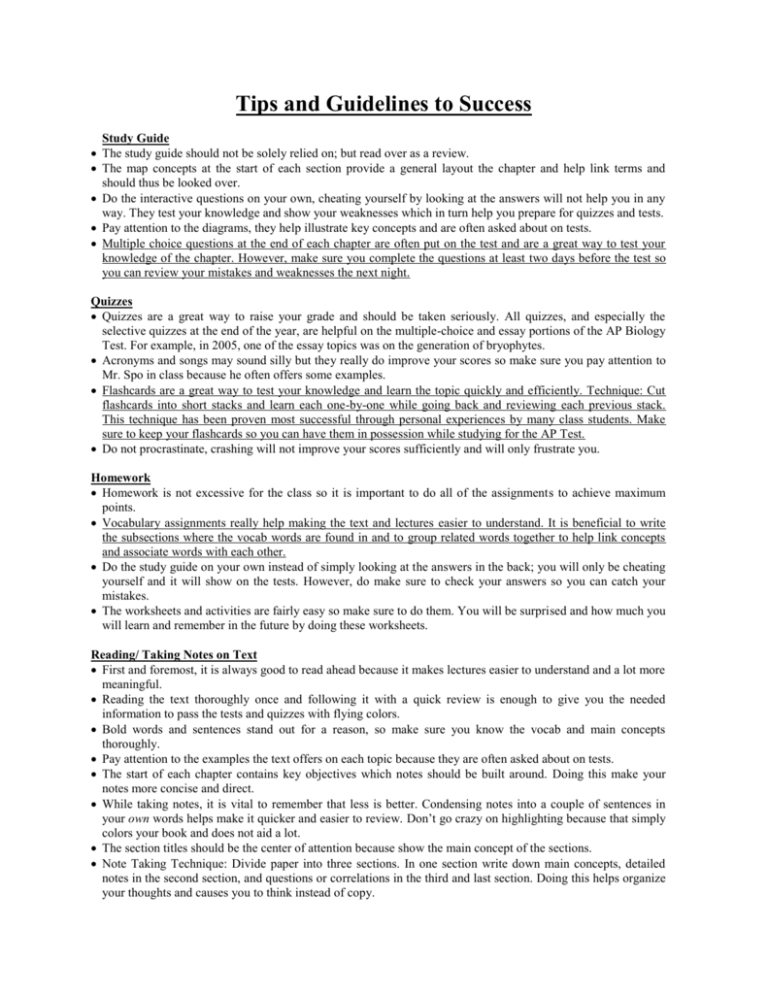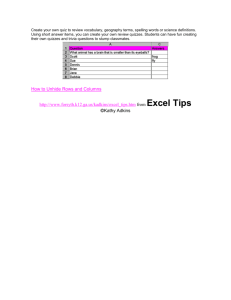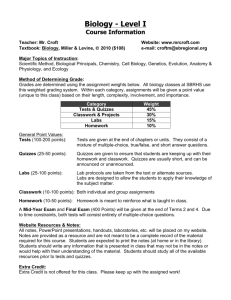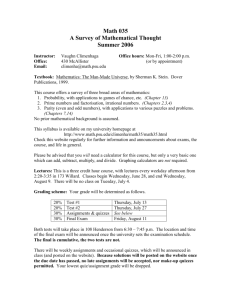Tips and Guidelines to Success
advertisement

Tips and Guidelines to Success Study Guide The study guide should not be solely relied on; but read over as a review. The map concepts at the start of each section provide a general layout the chapter and help link terms and should thus be looked over. Do the interactive questions on your own, cheating yourself by looking at the answers will not help you in any way. They test your knowledge and show your weaknesses which in turn help you prepare for quizzes and tests. Pay attention to the diagrams, they help illustrate key concepts and are often asked about on tests. Multiple choice questions at the end of each chapter are often put on the test and are a great way to test your knowledge of the chapter. However, make sure you complete the questions at least two days before the test so you can review your mistakes and weaknesses the next night. Quizzes Quizzes are a great way to raise your grade and should be taken seriously. All quizzes, and especially the selective quizzes at the end of the year, are helpful on the multiple-choice and essay portions of the AP Biology Test. For example, in 2005, one of the essay topics was on the generation of bryophytes. Acronyms and songs may sound silly but they really do improve your scores so make sure you pay attention to Mr. Spo in class because he often offers some examples. Flashcards are a great way to test your knowledge and learn the topic quickly and efficiently. Technique: Cut flashcards into short stacks and learn each one-by-one while going back and reviewing each previous stack. This technique has been proven most successful through personal experiences by many class students. Make sure to keep your flashcards so you can have them in possession while studying for the AP Test. Do not procrastinate, crashing will not improve your scores sufficiently and will only frustrate you. Homework Homework is not excessive for the class so it is important to do all of the assignments to achieve maximum points. Vocabulary assignments really help making the text and lectures easier to understand. It is beneficial to write the subsections where the vocab words are found in and to group related words together to help link concepts and associate words with each other. Do the study guide on your own instead of simply looking at the answers in the back; you will only be cheating yourself and it will show on the tests. However, do make sure to check your answers so you can catch your mistakes. The worksheets and activities are fairly easy so make sure to do them. You will be surprised and how much you will learn and remember in the future by doing these worksheets. Reading/ Taking Notes on Text First and foremost, it is always good to read ahead because it makes lectures easier to understand and a lot more meaningful. Reading the text thoroughly once and following it with a quick review is enough to give you the needed information to pass the tests and quizzes with flying colors. Bold words and sentences stand out for a reason, so make sure you know the vocab and main concepts thoroughly. Pay attention to the examples the text offers on each topic because they are often asked about on tests. The start of each chapter contains key objectives which notes should be built around. Doing this make your notes more concise and direct. While taking notes, it is vital to remember that less is better. Condensing notes into a couple of sentences in your own words helps make it quicker and easier to review. Don’t go crazy on highlighting because that simply colors your book and does not aid a lot. The section titles should be the center of attention because show the main concept of the sections. Note Taking Technique: Divide paper into three sections. In one section write down main concepts, detailed notes in the second section, and questions or correlations in the third and last section. Doing this helps organize your thoughts and causes you to think instead of copy. Pictures and diagrams in the text help outline the chapter and illustrate key concepts. Pay close attention to the pictures because they are of main focus on the tests and quizzes. The review notes and the review quiz at the end of the chapter are a great way to go over important points and test your knowledge. Nevertheless, relying solely on the reviews will not help you succeed in class because there are many examples listed in the text but not on the review. Taking Notes in Class Stay awake and pay attention! It’s good to get ahead by reading your textbook and doing your homework on time because lectures become easier to understand and make learning the notions simpler. Most notes in class will be based on overheads and diagrams in the book so it’s important to bring your text book so you can write notes directly in the book. Writing notes directly in your book allows you to review while reading and eliminates the chance of losing your notes on loose sheets of paper. Listen for hints by Mr. Spo about what could be on the test. During lectures he may wink or emphasize on a certain topic so it’s important to pay attention. Underline or highlight key points while taking notes; if you wait and do it later you may forget what points were most important at the time you learned it. Test Taking Tips Make sure you have thoroughly read the chapter to ensure success. Like most things, do not try and crash by learning everything because it will not improve your grade much. Use the study guide as a type of review. Look over the interactive questions and your answers; they are important points and were asked for a reason. Read the end of the chapter review, it highlights key aspects of the chapter and helps refresh your memory. Make sure to take the quizzes and multiple-choice activities in the book and the study guide at least two nights before the test so you can test your knowledge and improve on your weaknesses the following night. Many similar questions from the study guide will be put on the test as a way for Mr. Spo to check if you’re actually using the study guides, A couple nights before the test, start skimming through the chapter while reviewing your notes and highlighted portions and paying close attention to the subsection titles. The subsection titles help summarize the chapter by providing main points. Pay special attention to the pictures in the book. They help a lot by providing illustrations of focal notions of the chapter and they are of main focus on the tests. Relax!!! If you have done your reading and followed most of the tips provided here, you should be able to finish on time and in ease. The test is long but good pacing will help you in class as well as on the AP Test. You will not know every answer on the test. There are some random and unknown questions put in the test by Mr. Spo to test your composure, so don’t worry and carry on with the test. Test curves will eliminate any dispute over the use of these random questions and will stabilize your score to where it should be. But don’t rely on the curve to boost up your grade; you will get what you deserve. Miscellaneous Tips / Suggestions Be sure to always come to class prepared; failure to do so will result in an inability to partake in classroom activities and a loss of points. During passing period, try crashing even though there is no quiz or test. This constant and hectic review will not only increase your familiarity with the lesson but will prepare you for upcoming quizzes and tests and boost your confidence. Participate in class and don’t be scared to ask questions. Keeping quiet when you’re confused does not help. Ask Mr. Spo, or even your friends, questions on topics which you are uncertain over. Make sure to get onto a good and fast start. If you start out the semester with a good grade it will be much easier to keep it. Do not slack off ever! Maintaining a grade is much harder than getting a grade. Do not be selfish, help fellow students with their questions. Reading and paying attention in class helps you learn but teaching, without a doubt, is the best way to test your knowledge and help yourself learn. Extra credit does provide help for borderline grades but should not be relied on to dig you out of a hole at the end of the semester. Do not hold out and do all your extra credit at the end. Pace yourself by trying to turn in an extra credit assignment every two weeks or so. Moreover, try picking extra credit assignments that pertain to the subjects being studied in class. This will give you some added information which may help you on tests. Keep a separate binder for biology class. Sharing it with other classes will mix up papers and make it easier to lose notes and handouts. Moreover, try to keep all things organized and in chronological order so you will be able to refer to them in a quick and efficient manner. The internet is a great place to gain newly added information on topics being discussed in class. Feel free to go search on the internet for sites with outlines on key concepts, practice quizzes/tests, or animations to help illustrate specific topics. MAKE SURE TO FOLLOW THESE GUIDELINES BECAUSE THEY DO IN FACT ENSURE SUCCESS Student Reviews and Comments “If I would have had this sheet at the start of the year, I would have passed the class with flying colors.” – Jacob Mayeda (2005) “Following these guidelines will not only help you pass A.P. Bio, it will help you develop good studying skills and work habits for all your other class.” – Isaac Jenkins (2005) “Class was tough for me but with these tips I would have had no problem excelling in every area of biology” – Jordan Andino (2005) “The A.P Biology classes of 2006 and years to come should have no problem succeeding in class if they follow these guidelines.” – Teri Gibbs (2005)






